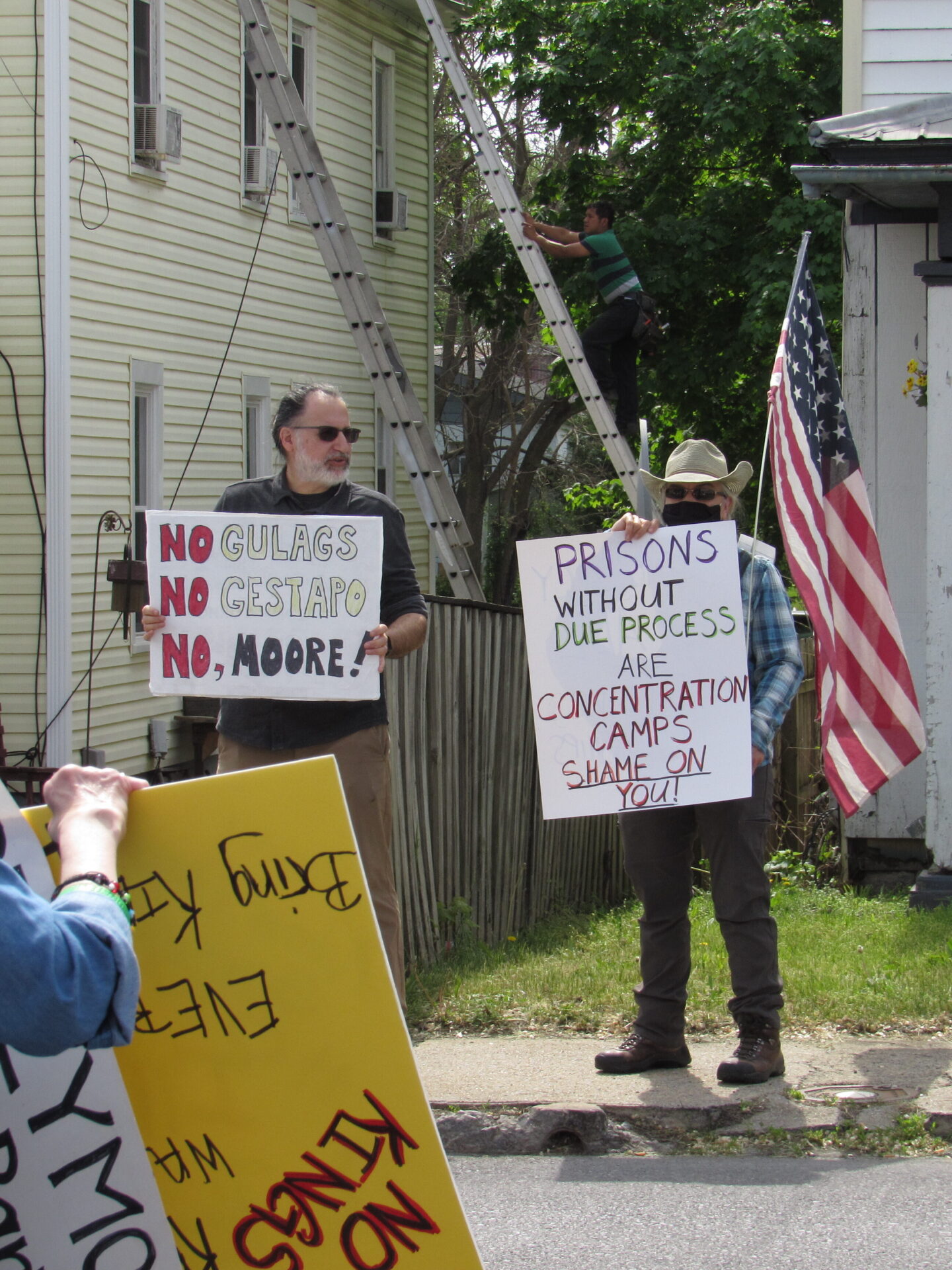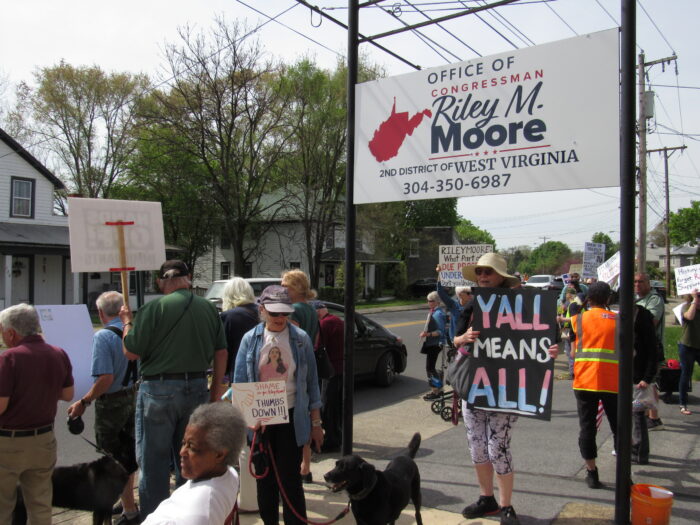Your browser doesn't support audio playback.
Updated on Thursday, April 24 at 10:21 p.m.
On Thursday morning, roughly 100 people toted picket signs to the Martinsburg office of U.S. Rep. Riley Moore, R-W.Va., staging a protest over the congressman’s recent visit to an El Salvador mega-prison.
Earlier this month, Moore traveled to the Terrorism Confinement Center (CECOT) in Tecoluca, El Salvador and took photographs outside a jail cell detaining dozens of people. In one photo that drew widespread attention, he gave the camera a double thumbs-up.
Protestors called for an apology from the state’s junior congressman, and urged him to break ranks with other Republicans in the United States Congress on issues like immigration. For them, that means pushing back against efforts led by President Donald Trump they say hurt everyday people, from deportations to federal spending cuts.
I just toured the CECOT prison in El Salvador. This maximum security facility houses the country’s most brutal criminals, including murderers, rapists, pedophiles, and terrorists. Several inmates were extremely violent criminals recently deported from the U.S.
— Rep. Riley M. Moore (@RepRileyMoore) April 15, 2025
I leave now even… pic.twitter.com/zhO8i2IbOd
Moore’s visit to El Salvador
CECOT is both massive and restrictive, barring those incarcerated from receiving visitors or going outdoors. Trump sent 238 migrants there in March under the Alien Enemies Act of 1798, a law used just three times in U.S. history.
The Trump administration has claimed these individuals participated in criminal activities in the U.S., but few are confirmed to have been charged with criminal offenses, let alone convicted.
Among those deported to El Salvador was Kilmar Abrego Garcia, an El Salvadorian citizen residing in Maryland. Trump officials later said Abrego Garcia was deported under an “administrative error,” but that they lack the ability to bring him back to the U.S.
Moore’s social media post met swift blowback from critics who say it makes light of a human rights issue.

Photo Credit: Jack Walker/West Virginia Public Broadcasting
Photo Credit: Jack Walker/West Virginia Public Broadcasting
“It was horrifying. It was absolutely horrifying,” said Carol Caflisch of Morgan County. Caflisch helped organize the protest with her county’s chapter of Indivisible, a national social action network formed in opposition to the Trump administration after the president’s first election in 2016.
“Seeing someone standing in front of [the prison] with a thumbs up sign, I mean, it turned my stomach,” Caflisch continued. “His behavior is despicable.”
Protesters expressed particular concern that those sent to El Salvador did not receive a formal trial in the United States.
“We feel like that is in contradistinction to the Constitution, where everybody is entitled to due process of law,” said Richard Mier, an organizer with Berkeley County’s Indivisible chapter. “You don’t have to be a citizen to be entitled to due process of law.”
Photo Credit: Jack Walker/West Virginia Public Broadcasting
Shepherdstown resident Scott Acuff argued Moore’s actions do not reflect the will or needs of his constituents.
“We want him to understand that West Virginians aren’t cruel. We don’t like the idea of putting people in barbaric prisons,” Acuff said. “We hate the idea of somebody who says he represents us going to one of those prisons and endorsing it just for the pleasure of Donald Trump.”
Moore told MetroNews last week he does not regret taking the photos, but did not intend to upset residents. A media representative from Moore’s office declined to comment on this story.
Residents push back
Representatives from multiple West Virginia chapters of Indivisible — plus an activist group called Hope in Alliance (HIA) — helped rally attendees for Thursday’s protest.
Representatives from the Berkeley, Jefferson and Morgan County chapters delivered a letter to a staff member at the Martinsburg office outlining their concerns and demands. The organizers demanded Moore issue an apology for the photographs, help negotiate Abrego Garcia’s release and oppose wider efforts to restrict immigration.
“We are all now working together,” said Susan Pipes, a leader of Jefferson County’s Indivisible chapter. “We understand that people sometimes just need a place to be able to voice their opinions and to feel safe.”
Photo Credit: Jack Walker/West Virginia Public Broadcasting
Some protestors, like Jon DiMarino with HIA, described the deportations as part of a broader federal effort led by the Trump administration to strip away protections for everyday people.
“They’re actively dismantling our entire system of government, trying to privatize it, killing agencies outright, indiscriminately firing people,” DiMarino said. “All of that motivates me. I live in America. I love my country, and I do not want to see it slip into a dictatorship.”
Caflisch said she and organizers want Moore to host a forum within his district to hear directly from constituents about their concerns regarding immigration and other issues.
“We asked him to attend a town hall in our location, and he has not responded,” Caflisch said. “When we were here last week, we were told by his representative that he couldn’t fit it into his schedule.”
But Caflisch said the social media posts from Moore told a different story.
“On that day, he was in El Salvador,” she continued. “We are very concerned that he had time to go for a photo op [in] El Salvador instead of being here and answering his constituents’ concerns.”
**Editor’s note: A previous version of this article listed the West Virginia Hope in Action Alliance as one of the protest’s organizers. In fact, the protest was co-organized by Hope in Alliance, a separate organization. The article has been corrected to reflect this.
